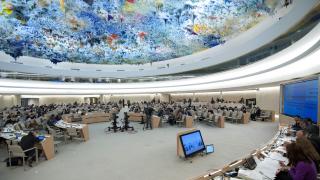
As the UK prepares to respond to its third Universal Periodic Review (UPR) this September, the United Nations Association – UK (UNA-UK) calls on the next Government to lead by example and act in the UK’s interest by strengthening our global system of rules.
On Thursday 4 May, the United Kingdom defended its human rights record before the UN Human Rights Council’s Universal Periodic Review (UPR) for the third time. On the following Tuesday, the UK officially received 227 recommendations as a result of these discussions. None of these recommendations were accepted or rejected out of hand, instead the UK decided to reserve its position on all 227 recommendations until the September Human Rights Council session, at which it will announce which recommendations it is accepting and which it is rejecting.
The UPR is a peer-reviewed process and central element of the UN’s human rights system which aims to hold states accountable for promoting and protecting fundamental freedoms. Every country has the right and ability to scrutinise every other country through a cyclical programme of reviews.
Ahead of the UK’s review, UNA-UK compiled a report for the UPR Working Group expressing concerns that the UK’s reputation as a leader in human rights and international affairs was at risk of being undermined. The evidence focused on strengthening the international human rights system, setting an example at home, and raising international standards.
What was recommended?
Many states raised various points UNA-UK championed in its report. The main issue raised was the UK’s proposal to replace the Human Rights Act 1998 with a British Bill of Rights. Countries including Ireland, Portugal and Switzerland, with which UNA-UK had undertaken advocacy work, advised that the UK should consult on the repeal to ensure that any new framework has no impact on the scope of protection or access to the remedies under the European Convention on Human Rights.
UNA-UK also recommended ratifying the International Convention for the Protections of All Persons from Enforced Disappearances (CED). Uruguay, Albania, Bosnia, Chile, France, Tunisia, Sudan, Panama, Japan, Iraq, Sierra Leone, Ghana, Portugal and Germany all made this recommendation. Once again, UNA-UK had carried out advocacy work with several of these countries.
In total, 37 states used recommendations suggested by UNA-UK, eight of them directly following our work with them on these issues.
Other recommendations covered areas including combating racism, discrimination and hate crimes; ending child exploitation and abuse; strengthening national mechanisms to combat human trafficking; and ensuring human rights law and standards are upheld in the fight against terrorism.
What’s next?
While broadly welcoming of the scrutiny that the UK had received, the UK’s responses did raise some questions about the UK’s engagement with international human rights mechanisms. Sir Oliver Heald QC, who headed the UK’s delegation, made the suggestion that ratification of international treaties such as the CED or the International Convention on the Protection of the Rights of all Migrant Workers and Members of their Families (CRMWF) was unnecessary as these rights were already well protected in domestic law.
This approach does not take into account the purpose of the treaty system of UN human rights protection. Ratifying international treaties contributes to the upholding of human rights protections in light of changes to domestic laws. It is also a process for universalising protection and buying in to a global system of norms and standards that strengthen rights protections globally. As UNA-UK argues in its latest report Keeping Britain Global: all of us benefit from these global protections, and it is therefore in the long-term self-interest of the UK to lead by example in adopting and championing these instruments.
In September, the Human Rights Council will present its recommendations and the UK will formally respond. However, this is only the beginning of the UK’s obligations. Over the next four years, it must work to implement the recommendations it has accepted.
We hope that the UK will adopt a positive approach ahead of September. While the UK will not face sanctions if it rejects recommendations, nor if it accepts but then does not meet them, the Universal Periodic Review process provides a mechanism for states to hold each other to account. Failure to demonstrate sufficient progress to its peers could be damaging to the values-based global brand that the UK seeks to project, and could erode the perceptions of the UPR – the only process by which the human rights records of all UN member states are regularly reviewed.






